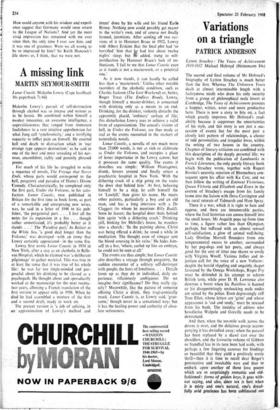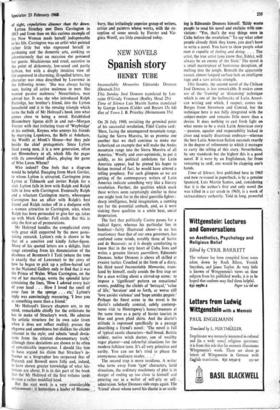Variations on a triangle
PATRICK ANDERSON
The second and final volume of Mr Holroyd's biography of Lytton Strachey is much better
than the first. Whereas The Unknown Years
dealt at almost interminable length with a lachrymose misfit who drew his only security from a group of philosophical male lovers at
_Cambridge, The Years of Achievement presents a happier, wittier, wiser and more productive hero. There is now a story to bite on:, a fact which greatly improves Mr Holroyd's read- ability because it suppresses the uncertainties of his style, and this story is not just a suc- cession of events but for the most part a closely knit pattern of relationships, a cluster of odd personalities and irregular loves, within the setting of two houses in the country. Chapters of literary criticism are combined with this description of the deeply personal life; we begin with the publication of Landmarks in French Literature, the only purely literary book which Strachey wrote, together with Rupert Brooke's neurotic rejection of Bloomsbury con- sequent upon his affair with Ka Cox; and we then follow the writing of Eminent Victorians, Queen Victoria and Elizabeth and Essex in the context of Strachey's escape from his family home into the liaison with Dora Carrington and the rural retreats of Tidmarsh and Ham Spray.
There is a war, which it is right to hate and oppose, and there are innumerable parties, where the frail historian can amuse himself into the small hours. Mr Asquith pops up from time to time, a figure rather. less than Olympian, perhapt, but suffused with an almost sensual self-satisfaction, a glow of animal well-being. Lady' Ottoline Morrell flounders from one temperamental excess to another, surrounded by her pug-dogs and her poets, and always good for the sort of titter one shares so cosily with Virginia Woolf. Various follies and in- justices call for the voice of a new Voltaire: despite the horrid stippling and ungainly shapes favoured by the Omega Workshops, Roger Fry• must be defended in his attempt to reform British taste, while poor D. H. Lawrence also deserves a boost when his Rainbow is banned or his disappointingly unshocking male nudes are seized by the police. Even-depressingly stiff Tom Eliot, whose letters are `grim' and whose appearance is 'sad and seedy,' must be rescued from bis bank. The timidity of editors who bowdlerise Walpole and Greville needs to be denounced.
And then, when the ten-mile walk across the downs is over, and the delicious gossip accom- panying it has dwindled away; when the parasol has been replaced by a shawl cast over the shoulders, and the favourite volume of Gibbon or Stendhal has in its turn been laid aside, with perhaps a few lingering caresses for bindings so beautiful that they yield a positively erotic thrill—then it is time to recall dear Roger's provocative and tweakable ears and thus to embark nob& another of those love poems which are so surprisingly romantic and old- fashioned forms of golden boys, it goes with- out saying, and aiso, since sex is best when it is misty and one's natural, one's dread- fully avid prurience has been sublimated out of sight, copulation dimmer than the dawn.
Lytton Strachey met Dora Carrington in 1915 and from then on this curious example of the New Woman made herself indispensable to his life. Carrington was an artist who painted rather little but who expressed herself in gardening and the domestic arts, cooking so adventurously that on occasion she poisoned her guests. Mischievous and cruel, secretive to the point of dishonesty, low-sexed and partly lesbian, but with a deeply intuitive view of life expressed in charming, ill-spelled letters, her character was once described by Lawrence in the following terms: 'She was always hating men, hating all active maleness in men. She wanted passive maleness.' Nevertheless, men adored her. It was she who introduced Ralph Partridge, her brother's friend, into the Lytton household and it is the ensuing triangle which turns the bulk of Mr Holroyd's book into what comes close to being a novel. Established Bloomsbury figures drift in and out—Morgan Forster with that irritating trace of `Weybridge' in his outlook, Keynes who annoys his friends by marrying Lopokova, the Bells at Asheham, the Woolfs at Monk's House—but they pale beside the chief protagonists. Since Lytton liked young men, it is a new generation, often not Bloomsbury at all, which fills the pages with its convoluted affairs, playing the game of Who Loves Whom?
Who indeed? One feels that a diagram would be helpful. Escaping from Mark Gertler, to whom Lytton is attracted, Carrington joins Lytton at Tidmarsh and invites Ralph for a visit. Lytton falls in love with Ralph and Ralph falls in love with Carrington. Eventually Ralph and a reluctant Carrington marry, whereupon Carrington has an affair with Ralph's best friend and Ralph rushes off in a dudgeon with a woman attractive to Carrington, who, when Ralph has been persuaded to give her up, takes up with Mark Gertler. Full circle. But this is only the first set of permutations.
Mr Holroyd handles the complicated story with great skill supported by the most pains- taking research. Lytton's role is shown to be that of a sensitive and kindly father-figure. Many of his quoted letters are a delight, their range extending from his denunciation of the deadness of Berenson's I Tatti (where the tone is exactly that of Lawrence) to the story of how he began to pick up a yellow-haired tart in the National Gallery only to find that it was the Prince of Wales. When Carrington, on the eve of her marriage, wrote the splendid letter containing the lines, 'How I adored every hair of your head . . . How I loved the smell of your face in the sponge . . . etc,' Lytton's reply was convincingly reassuring, 'I love you as something more than a friend.'
Mr Holroyd's literary chapters are, to my mind, remarkable chiefly for the criticisms he has to make of Strachey's work. He admires the artistic structure for its own sake (even when it does not reflect reality); praises the elegance and smoothness but dislikes the cliches inherent in the style; and admits 'small devia- tions from the strictest documentary truth,' although these deviations are shown to be often of considerable importance. I should like him to have argued his claim that Strachey's in- fluence as a biographer has surpassed that of Plutarch and Boswell more fully and, indeed, to have shown greater knowledge of what his- torians are about. It is in this part of the book that the Mr Holroyd of the first volume tends to raise a rather muddled head.
But the vast work is a very considerable achievement i it huthariises a leader of Blooms-
bury, that irritatingly superior group of writers, critics and painters whose works, with the ex- ception of some novels by Forster and Vir- ginia Woolf, are little considered today.



































 Previous page
Previous page